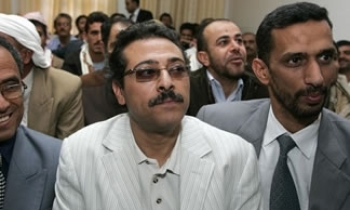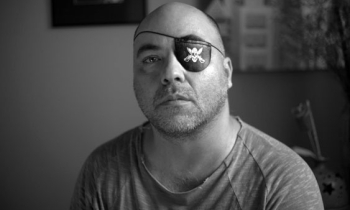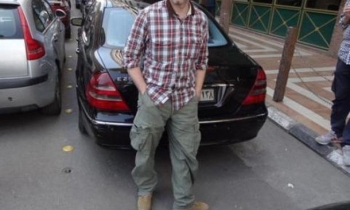The recent cases of prosecution of journalists in Azerbaijan has press freedom advocates worried the world over.

The OSCE (Organization for Security and Co-operation in Europe) Representative on Freedom of the Media, Miklos Haraszti, has expressed concern over recent cases of prosecution of journalists in the country and proposed a legal reform as a way out of the situation.
In a letter to Azerbaijan President Ilham Aliyev, Haraszti wrote: "The current wave of oppressive lawsuits against journalists makes it vital that your March 2005 initiative be followed by tangible action. At that time, you appealed to public officials not to file lawsuits against the media. I am disappointed that your moratorium request is no longer being respected."
Five journalists and a number of newspapers are facing criminal and civil defamation cases. Some of them, including Shahin Agabayli, Editor-in-Chief of Milli Yol, and Fikret Faramazoglu, Editor-in-Chief of 24 Saat, have already received harsh sentences, including imprisonment. Mirza Sakit Zahidov, a satirical poet and journalist of Azadliq, has been accused of drug charges, an allegation he has denied.
The OSCE reaction on Monday came the day before Zahidov was scheduled to make a second appearance in court. During the first hearing of the trial in Baku on August 29, he told presiding judge Azer Orujev that the charges against him were "lies and a provocation." Zahidov has been accused under article 234.4.3 of the criminal code of "buying a large amount of drugs with the aim of selling them again."
He claimed that a police officer, Adyl Alekerov, slipped the drugs into his pocket at the time of his arrest, which was carried out on orders from higher-ups," he alleged. "Representatives of the authorities said in public that I had to be sidelined," he said, adding that he was also physically mistreated by the police when he was arrested.

Zakhidov was arrested on June 23 and charged with the possession and sale of a narcotic by officers of the anti-narcotics department of the Azerbaijani interior ministry. According to a statement issued by the ministry, 10 grams of heroin were found on Zakhidov's person and confiscated following the arrest.
Zahidov had on July 25 even gone on a hunger strike in protest against his arrest. He lost six kilos in weight and his state of health deteriorated sharply. He called off his hunger strike on August 5. Zahidov has a reputation for criticising government officials, parliamentarians and religious leaders in his articles.
A support committee formed by Azadlig journalists to campaign for his release has established many irregularities in the way the authorities have handled the case. Led by Emin Huseynov, a former correspondent for news agency Turan, who has himself been in poor health every since being beaten up by the police in October 2003, the support committee says the charges were trumped-up.
Among the many irregularities it discovered was the fact that the driver of the taxi Zahidov was in at the time of his arrest was never questioned as a witness. Moreover, as of July 26, Zahidov's office and apartment had not been searched. And the police did not find any buyer or seller of drugs who might have been in contact with Zahidov.
The authorities have produced no evidence that Zahidov was a drug pusher aside from a statement signed by doctors at the Republican Drug Centre saying he was not a drug addict and therefore must have had the drugs for the purposes or resale.

At the same time, authorities also say there were traces of drugs in Zahidov's blood because he had a urine test that was positive. However, no copy of any drug test report was produced. Some of the committee's members took a drug test, and were told by an expert that blood tests were not usually carried out in Azerbaijan. The committee also established that Zahidov's name was not on any list of people tested for drugs. When asked about this, the health ministry's press office refused to comment.
Last month, the International Press Institute (IPI) too expressed concern over the continued criminalisation of defamation in Azerbaijan. IPI Director Johann Fritz said, "The mass media continues to work in a difficult environment. IPI condemns (Shahin) Agabayli's sentence because defamation should never be criminalised. Criminal insult laws are an anachronism and should be removed from every legal system."
Shahin Agabayli was arrested on August 9 and tried the next day on four charges. Agabayli was sentenced to a year in prison for allegedly insulting and blackmailing former parliament spokesman Arif Ramhimzadeh in his publication. The charges stemmed from a 2005 article, although Agabayli reportedly did not write the article and was not editor at the time of its publication.
Agabayli also faces criminal defamation charges in a case brought by Interior Minister Ramil Usubov, who claims Agabayli wrote an article linking Usubov to Haji Mamedov, a former interior ministry officer facing trial on murder and kidnapping charges.
Haraszti pointed to the fact that in all of the cases the plaintiffs were public officials, including Usubov, who has filed five suits against the media this summer. The letter urged the authorities to ensure full access for journalists to all trial hearings to provide transparent and detailed information to the public. The OSCE Representative said it was time for Azerbaijan to go beyond the political moratorium on defamation, and translate the President's intention into legal reform.

"The reform could start with an immediate legal moratorium on criminal suits against journalists, and be completed by the transfer of the libel, defamation, and verbal insult provisions from the Criminal Code to the civil law domain. Simultaneously, civil law should be revised so that it can handle defamation offences in a measured way. This should be made in compliance with the principles of the European Court of Human Rights. In particular, rational ceilings have to be established for damage payments; and the civil libel provisions should acknowledge that public figures have to endure harsher criticism than ordinary citizens," wrote Haraszti.
Haraszti also said that his office was ready to assist Azerbaijan in reforming its media legislation to improve the working environment for journalists.
"We strongly believe that prison terms are never justified for defamation cases, no matter how unsettling or offensive they may seem to those involved," Fritz continued. "Defamation should be treated under civil law, to be adjucated between the parties by civil courts. Moreover, this latest decision will only encourage greater self-censorship and this is to the detriment of not only the journalism profession, but also the country's citizens who will be deprived of valuable information."
The government, however, has denied that it is pressuring the media. The socio-political department head at the President's office, Ali Hasanov, told the Azeri-Press information Agency (APA), "Freedom of expression and press is fully guaranteed in Azerbaijan under legislation. The journalists facing prosecution should understand that it is time for them to work in line with laws. The right of an individual is limited until the beginning of another one. Lawsuits against journalists are observed in most countries, so this cannot be assessed as pressure against journalists."









